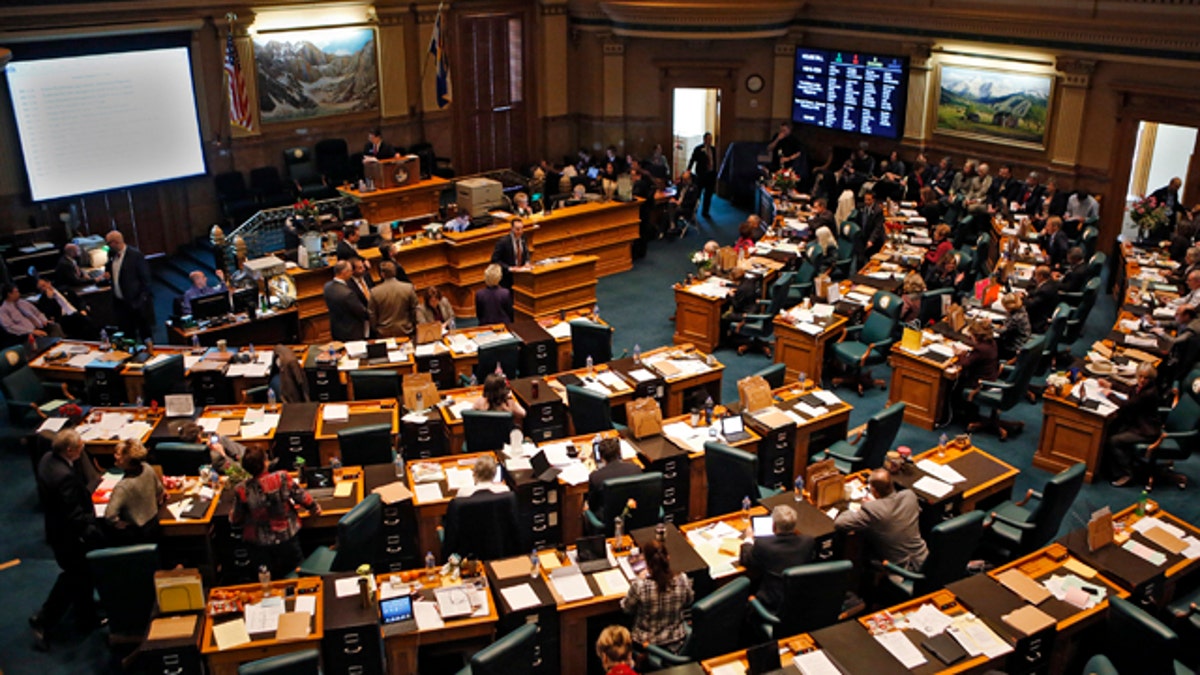
Feb. 15, 2013: Colorado House members gather in their Chamber at the Capitol in Denver. (AP)
DENVER – Limits on the size of ammunition magazines and universal background checks passed the Colorado House on Monday, during a second day of emotional debates that has drawn attention from the White House as lawmakers try to address recent mass shootings.
The bills were among four that the Democratic-controlled House passed amid strong resistance from Republicans, who were joined by a few Democrats to make some of the votes close.
The proposed ammunition restrictions limit magazines to 15 rounds for firearms, and eight for shotguns. Three Democrats joined all Republicans voting no on the bill, but the proposal passed 34-31.
"Enough is enough. I'm sick and tired of bloodshed," said Democratic Rep. Rhonda Fields, a sponsor of the bill and representative of the district where the shootings at an Aurora theater happened last summer. Fields' son was also fatally shot in 2005.
Republicans argued that the proposals restrict Second Amendment rights and won't prevent mass shootings like the ones in Aurora and a Connecticut elementary school.
"This bill will never keep evil people from doing evil things," said Republican Rep. Jerry Sonnenberg.
The House also approved a bill requiring background checks on all gun purchases, including those between private sellers and firearms bought online.
Other proposals would ban concealed firearms at colleges and stadiums, and another requires that gun purchasers pay for their own background checks. Democrats eked out the closest vote on the background check measure, which passed on a 33-32 vote.
Democratic Rep. Ed Vigil, who represents rural southern Colorado, voted against the four bills, saying his decision was rooted in the state's rugged history.
"This is part of our heritage. This is part of what it took to settle this land. I cannot turn my back on that," he said.
But even though a few Democrats joined Republicans in voting no for the bills, the Democrats' 37-28 advantage in the House gave them enough leeway.
The Senate still needs to consider the proposals. Democrats will need to be more unified in their support there because their advantage is only 20-15. That means Republicans need only three Democrats to join them to defeat the bills.
House lawmakers began debating the bills Friday. Lawmakers debated for 12 hours before giving initial approval to the bills, setting up the final recorded votes Monday. During the debate Friday, Vice President Joe Biden called four Democrats, including two in moderate districts, to solidify support for the measures.
Democratic Rep. Dominick Moreno, who represents a district in suburban Denver, was among the four lawmakers. He said Biden "emphasized the importance of Colorado's role in shaping national policy around this issue."
Castle Rock Republican Rep. Carole Murray brought up Biden's calls during Monday's debate, saying she didn't appreciate "East-coast politicians" trying to influence Colorado legislators.
Democratic Gov. John Hickenlooper supports the expanded background checks, and thinks gun buyers should pay for them. He also said he may support limits on the size of magazines, if lawmakers agree to a number between 15 and 20. He said he hasn't decided whether to support banning concealed firearms on campuses and stadiums.
Republicans say students should have the right to defend themselves.
"Do not disarm our young adults in general and our young women in particular on our college campuses in the name of a gun-free zone," Republican Rep. Jim Wilson said.
The gun debate highlights a fundamental philosophical difference between many Democrats and Republicans.
"I resent the implication that unless we all arm ourselves we will not be adequately protected," said Dickey Lee Hullinghorst, the Democrats' leader in the House.
Republican Rep. Christ Holbert became emotional while explaining his opposition to the bills. He said he understood Fields cares about the bills, because of her district and because her son was shot and killed in 2005.
"But I care passionately about the United States Constitution and the constitution of this state, and the oath that we have taken," Holbert said.




